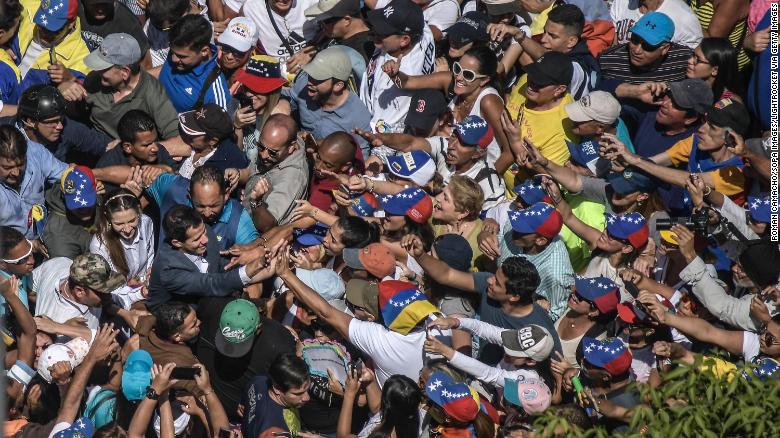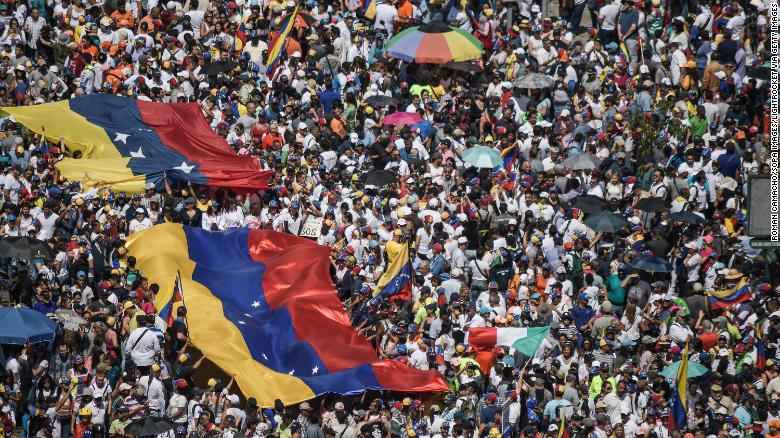Venezuela, a Humanitarian Crisis Eluding Solution
"I'm not sure the U.S. has a Plan B if this doesn't work in getting rid of Maduro."
"I'm afraid that if these sanctions are implemented in their current form, we're looking at starvation."
Francisco Rodriguez, economist, Torino Capital, Venezuela
"We can't charge, we can't receive money; Our finances are paralyzed."
"There will be major collateral damage."
Reinaldo Quintero, head, Venezuelan Oil Chamber
"If these sanctions don't force the endgame soon, they will cause a lot of pain for the people."
"The rich will not stop getting richer, it's the workers who will shoulder the cost of these measures."
Jose Bodas, anti-government oil union leader, Puerto La Cruz
"They [Venezuelan opposition] want to draw a caricature of a country in a humanitarian crisis, a dictatorship, and the U.S. opening their hands to help a people in need."
"The reality is that it is not any help, it is a message of humiliation to a people."
Nicolas Maduro, President, Venezuela
"If this gets worse this week because of the measures to pressure the government, I'm going to go crazy."
"We're already just barely surviving. To get worse, we would have to be hit by a meteorite."
Juliana Lopez, owner, Caracas pharmacy
 |
| A crowd surrounds Juan Guaido during a protest against Maduro |
The Venezuelan opposition under self-declared President Juan Guaido, leader of the Venezuelan National Assembly, recognized by the United States, Canada and many other Western nations alongside much of Latin America, plans to have humanitarian aid sponsored by the United States brought into his beleaguered country to offer medical aid and food to feed starving Venezuelans. The aid convoy was meant to cross the border with Colombia, until the Maduro administration blocked its entry.
It would have represented nothing but a brief stop-gap measure, as much to reassure Venezuelans that the opposition leader purporting to represent their best interests as a much-needed replacement however temporary until democratic elections could proceed, to the current administration of Nicolas Maduro, the anointed replacement of Hugo Chavez whose ruinous policies Maduro has carried on, beggaring the Venezuelan economy and creating a vast stream of refugees.
Oil sanctions imposed on Venezuela by the Trump government in the United States are biting even deeper into the tragic failure of the country to support a standard of living for its population. Runaway inflation, a worthless currency, a drop in oil production, huge unemployment statistics, a shortage of medicines and basic foodstuffs, a situation reminiscent of Zimbabwe under its former dictator all now afflict Venezuela.
Under the sanctions exports have plunged and the country's banking system is frozen. Russia has stepped in to give aid to Venezuela to sell its oil. A country of 30 million people forced into a dire humanitarian crisis see themselves becoming ever mired into a deeper swamp of despair. Oil exports to the United States had given the country the largest source of cash, and now it has plummeted by 40 percent. A dozen tankers of Venezuelan crude are stranded.
Rosneft, Russia's state-operated oil company is hugely invested in Venezuela's petroleum extraction and plans now to increase its output in Venezuela, defying sanctions. Hardly surprising since there is no cooperation between Russia and the U.S., hugely at loggerheads with one another, in a classic understatement. Since the transfer of power to Maduro in 2013, the Venezuelan economy shrank by fifty percent, making survival in the country a matter of desperation.
Maduro's regime and its human rights violations led the U.S. to attempt to force it to withdraw in favour of Mr. Guaido, as the rightful president of Venezuela. U.S. companies and individuals have been banned from dealing with Petroleos de Venezuela, the state-operated oil company which provides a staggering 90 percent of the country's hard currency.
Maduro will not budge to demands that he resign. Before sanctions the country imported about 120,000 barrels of oil and refined petroleum products daily to blend lighter U.S. oil with Venezuela's thicvk crude oil to enable it to flow through pipelines to ports for export.
Energy experts feel Venezuela could retain some oil income through decreasing its price and shipping to Asian customers. For their part, Venezuelans worry that reduced revenue may still see Maduro remaining in power while worsening shortages of food and medicine, forcing the few remaining private businesses to shutter.
 |
| Guaido supporters hold huge Venezuelan flags during a protest against Maduro |

<< Home